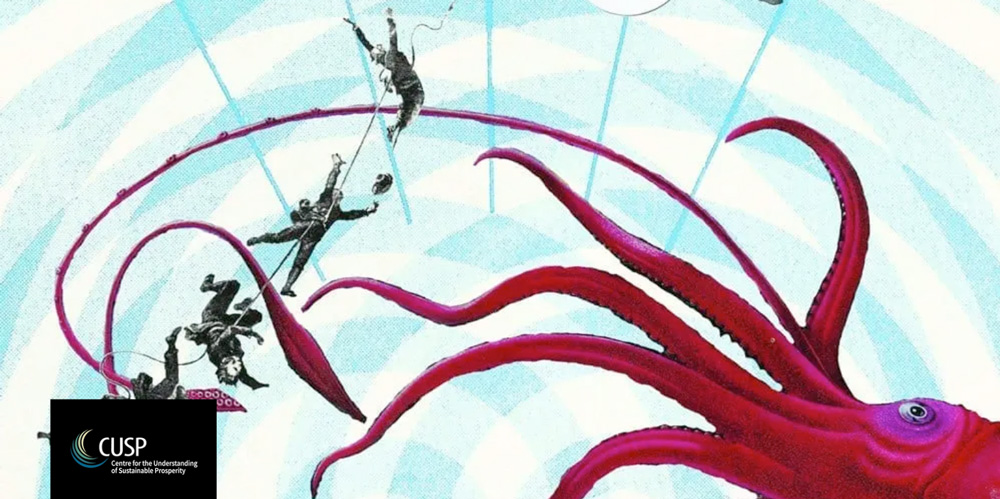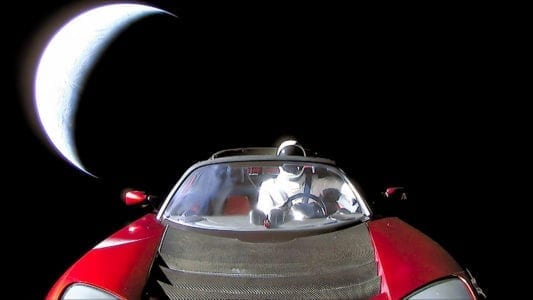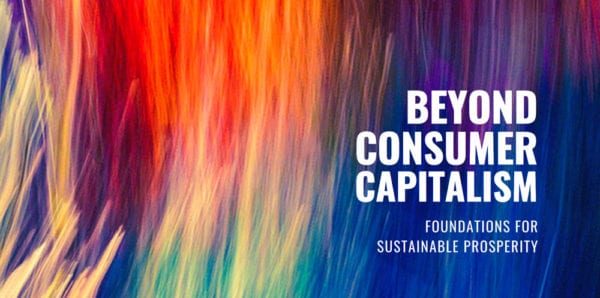Why we’ve never had it so good, yet everything has to change
The world is confusing because two apparently contradictory things seem true: we’ve never had it so good, yet everything has to change. To address today’s challenges we need a more conscious society, CUSP fellow Jonathan Rowson finds, and work “towards a level of depth, insight and abstraction that connects human nature and experience with societal meaning and purpose”—in the context, he writes, of a shared curiosity towards reality as a whole. (This blog first appeared on the RSA website, 19 Oct 2017.)

More people than ever are enjoying the fruits of economic and technological progress, but our ecological and existential roots are not healthy, cannot repair themselves without our attention, and we may need to grow something entirely new. I believe the ultimate cause of our confusion lies in the societal challenge we have become accustomed to ignoring – the inherent nature, meaning and purpose of it all.
The influence of our ideas of what is real and normal and worthwhile are so subtle and pervasive that we can barely discern their effects, and yet they influence absolutely everything we do. To really grasp ‘what’s going on’ we need to learn to think beyond the problems and the policies and the systems, at the level of the Social Imaginary – what Philosopher Charles Taylor calls ‘a wider grasp of our whole predicament’.
Grasping our whole predicament means learning how to look within, between and beyond the challenges of our time, which is a challenge best characterised as spiritual – life in its broadest, fullest and deepest perspective. That means, for instance, building on current policy interest in identity, behaviour change and wellbeing by pushing these inquiries further than we usually do. I first made a version of this case during a two-year project involving about 300 people at the RSA from 2012-2014, culminating in the first edition of Spiritualise.
With the challenge of identity politics, for instance, to spiritualise means going within identity to consider the integration and transcendence of the self. In the context of ecological constraints to spiritualise means going between climate change and economic growth towards a sane macroeconomics grounded in a social logic that is not tied to consumerism. And in the context of calls for behaviour change, to Spiritualise is to think about what personal transformation looks like. That means going beyond subjective wellbeing as a self-reported metric with a form of flourishing that is more about purpose than pleasure, where individual development becomes a collective endeavour that responds to societal needs. (The German term is Bildung).
The impact of the RSA Spirituality project led me to join forces with Swedish social entrepreneur and theorist Tomas Bjorkman to create a new organisation, Perspectiva, which is dedicated to improving our understanding of the relationship between complex global challenges and the inner lives of human beings. Together with the RSA, Perspectiva recently published a second edition, which goes online today: Spiritualise: Cultivating spiritual sensibility to address 21st century challenges.
In what follows I try to refine and update the case for why this kind of inquiry is needed.
How are you, world?
Those who feel we are all going to hell in a hand cart are mistaken. A dispassionate look at data on global development strongly suggests the world has made significant progress on lots of things that really matter. For instance, absolute poverty looks may soon be eradicated, inequality between countries is actually falling, physical violence and war are reducing. Books like The Evidence for Hope by Kathyrn Sikkink, Progress by Johan Norberg and The Better Angels of our Nature by Steven Pinker may not be completely persuasive, but they are a useful corrective to the lazy and sometimes indulgent contention that everything is obviously failing apart. These optimists suggest it merely feels like things are bad because for sound evolutionary reasons we have a negativity bias and we imbibe more news than we used to – news that reinforces the bias. Oxford Economist Max Roser recently suggested on Twitter that without that bias the news story of the day for the last 25 years could (and perhaps should) have been: “Number of people in extreme poverty fell by 137,00 since yesterday”.
And yet, others like Oliver Burkeman rightly say that kind of thinking is too facile, and for a range of reasons. The way the data is gathered ignores forms of harm and violence to animals and ecosystems and undervalues long term systemic risks and emergent properties hidden by structured data. The more connected and networked and algorithmic the world becomes, the more vulnerable the whole becomes when its parts start to weaken. Moreover, apparent progress in the developing world still often entails enduring debt and servitude, for instance to the IMF or World Bank, while apparent economic progress in the developed world does not seem to improve subjective wellbeing – indeed if anything perhaps the opposite. And then there is the justified impression that our ecological and institutional foundations may be collapsing rather than evolving, for instance through democratic deconsolidation, the rise of artificial intelligence and acute ecological constraints and consequences.
There is clearly some truth on both sides of this ‘how are we doing world?’ question, but debates about perception, research and how good or bad things really are will always be contestable, and somewhat obtuse. What matters personally and politically is not how much things have improved since the past but how we should act now to shape the future through what is latent in the present.
Crisis as meta crisis
The etymology of ‘crisis’ is about decisive moments in times of difficulty, and originated in the need to reverse the course of a disease before it was too late. The notion that we are responding to a crisis is not therefore about a litany of problems or a general call to arms but something quite specific – the recognition of the timeliness of intentional action in the context of seismic and systemic change that will either happen to us unwittingly and unwillingly or through us, creatively and imaginatively.
The reason it is not obvious to everybody that we have to alter course is that unlike, say, the cold war where the crisis and the risk was relatively clear, the nature of our crisis is partly about our inability to diagnose and articulate its implicit character. Theologian and Social Critic Rowan Williams puts it like this:
“There are crises and there are meta-crises: a system may stagger from one crisis to another but never recognise the underlying mechanisms that subvert its own logic…If we are now panicking about the triumph of a politics of resentment, fear and unchallengeable untruthfulness, we had better investigate what models of human identity we have been working with. Our prevailing notions of what counts as knowledge, our glib reduction of democracy to market terms, our inability to tackle the question of the limits of growth – all these and more have brought us to the polarised, tribal politics of today and the thinning out of skill, tradition and the sense of rootedness. Treating these issues with intellectual honesty is not a sign of political regression but the exact opposite.”
The concept of a meta-crisis is capacious and pertinent. I develop the idea to some extent in Spiritualise but it opens up a whole new domain of inquiry that is mostly untapped. ‘Meta’ often means self-referential, but can also mean across, after, beside, about, through, within or beyond.
According to CUSP colleague Ian Christie (personal communication) today’s meta-crisis arose roughly as follows: the neoliberal economic order established since the late 1970s is unable to cope with the strains and shocks to its model of capitalism since 2007-8. There are other ideological games in town, but all lack critical mass, intellectual confidence and a narrative of hope and plausible change. All contending ideological camps face challenges that induce panic, disavowal and confusion: the ecological crises of climate disruption and global destruction of species and habitats; the fear of unstoppable technological innovations and the creation of techno-systems on which we will depend (eg geoengineering) and which will destabilise our societies (artificial intelligence and robotics); the question of how fluid and contested group identities can be governed online and offline, avoiding violent conflicts and promoting cooperation. The meta-crisis of our time is the inability of current ideologies and governance systems to make sense of these oncoming challenges, and of so many individuals to make sense of their lives, priorities and common cause in the face of the larger paralysis of our cultures.
The meta crisis is the crisis. We need timely and intentional action, but lack the vision, culture and institutions necessary to act in a timely and intentional way (see Reflexive Realism and hope for the future).
We need a Plan E
To make the nature of our crisis a little more tangible, consider the following 6 ‘E’s. The shared first letter is a little gratuitous, but it’s a useful way to reinforce the idea that these issues are inextricably linked. The crisis is about our home (ecological) our values (ethical) our freedom(existential) our work(economic) our knowledge(epistemic) and our feelings(emotional) respectively. These issues are not exhaustive but the point is that the world faces a crisis because we risk losing control of all of these fundamental things that we have taken for granted for too long.
Ecological: Climate change is a uniquely exacting civilisation-level challenge that is already beginning to kill and destroy. The ecological crisis is meta because it is our habits that continue to destroy our habitat; our lives that risk destroying our living conditions.
Ethical: Ultimate values are increasingly subverted by instrumental ones and we seem to lack a compelling and credible vision of the good life at scale. Human rights are under threat around the world and no longer seem to act as an ethical bulwark for individuals against the state. The ethical crisis is meta because our notions of political and economic value (eg ‘jobs and growth’) are not serving our deeper values (eg love, truth, friendship) and valuing through quantification may denature the quality of the things we value.
Existential: Secularisation and neoliberalism combined means questions of meaning and purpose and intentionality towards the future are no longer a communal endeavour. The existential crisis is meta because there is no sense of shared purpose to establish purpose. And the question of the meaning of life has become almost meaningless – joked away with the number 42.
Economic: We don’t really know how to respond to Artificial intelligence at scale. We see it as ‘tech’ but it will be function economically. The combination of AI, data hoarding and analytics, the underlying growth imperative and the pervasive marketing that serves it means our freedom to ‘want what we want to want’ is under siege, as James Williams argued brilliantly in a recent RSA talk. This issue is meta because we are literally paying attention, but we are not yet paying attention to that.
Epistemic: Our ways of knowing are inadequate. We lack the cognitive and emotional complexity needed to understand and act on wicked problems. More generally the truth is in trouble due to rampant relativism and post-truth politics and we may even be losing our sense of epistemic shame. This issue is meta because at a cultural level our ways of knowing are often inadequate but we do not know that (see previous RSA project Beyond the Big Society for further details).
Emotional: The combination of underwork for some and overwork for others; social isolation for some and burden of care for others; and urbanisation and economic insecurity for many seems to be undermining mental health at scale, with depression, anxiety and loneliness rising in many parts of the world. This emotional issue is meta because when we observe problems on a daily basis, for instance children fleeing violence and drowning trying to reach a safe shore, we rarely feel what we feel we should be feeling – eg horror, shame, anger.
Some of these points are developed in the new edition of Spiritualise, and each of them needs fuller referencing, consolidating and developing that I can give here, but together they give some clarity to the notion that we face a particular kind of crisis that calls for new ways of thinking and acting– the question is what to do about it.
Spiritual Sensibility as a response to the meta crisis
I believe a critical part of the response to the crisis is to value and cultivate spiritual sensibility.
I think of spiritual sensibility as a disposition towards reality characterised by concern for the fullness of life and experienced through simultaneous intimations of aliveness, goodness, understanding and meaning. Those glimpses of wholeness and integration have a texture that is at once emotional, ethical, epistemic and existential – the feeling of being alive, the conviction that something matters, the intuition that the world makes sense, and the experience that life is meaningful respectively. More substantively, as indicated in part three of Spiritualise, cultivating spiritual sensibility is about deepening our engagement with love, death, self and soul, the experience of being, belonging, becoming and beyondness respectively.
What characterises aspects of sensibility that are spiritual and not merely holistic or emotional or psychological, or philosophical or systemic or ethical or perceptual or epistemic or existential or cultural or aesthetic or creative…is that it is the disposition to relate to whatever is within and between all these qualities when considered and experienced together, yet defined or subsumed by none of them. Some call that ‘whatever’ spirit, but it can also be thought of as life as such, or perhaps just relationships between things seen in their fullest, broadest and deepest possible context (see part five of Spiritualise).
The reason I care about spiritual sensibility is that in a fragmented and overly instrumental world we need to fight for the intrinsic value of experiencing reality as a whole, the relationships that comprise it, and the diverse and often implicit understandings needed to appreciate it. What we need is not so much ‘the provision of spirituality’, as if offering a new cultural product or service. What we need is a purposive vision of individual and collective spiritual growth and renewal that emerges in response to the world as we find it, and evolves in response to the world we seek to create. Questions about the nature, value, meaning and purpose of life as such are matters of fundamental concern and should be aired publicly, which means those who sense the meta-crisis is the challenge and value spiritual sensibility as a response, need to find their voice, and their power.
Part of the mission of my new organisation Perspectiva is to help in that process. We seek to bring about ‘a more conscious society’ because the meta crisis is largely about our collective failure to make features of life that are implicit and unconscious, more explicit and conscious, without distorting or denaturing them.
Waking Up, Growing up and Wising Up
A more conscious society would be one where we continue to disagree about the good life and how to get there but retain some common cause by jointly recognising the need to grow in certain ways. For now I think of this hidden curriculum in terms of waking up, growing up and wising up.
Waking up is spiritual and political. Spiritual experience takes various forms but at its most basic it is recognising that we are often sleepwalking through life, that automaticity is a feature not a bug of our lived experience. Waking up is also about overcoming what Marx and Engels called ‘false consciousness’, and what Adorno calls ‘the ontology of false conditions’. Political Scientist Stephen Eric Bronner puts the political side of waking up as follows:
“At stake is the substance of subjectivity and autonomy: the will and ability of the individual to resist external forces intent upon determining the meaning and experience of life.”
In policy terms waking up might mean meditation connected more profoundly to social and political context; for instance through volunteering or civic service. More generally it might mean taking rituals and initiations more seriously as a means to stay awake, without the rituals themselves becoming merely habitual.
Growing up is about recognising that being an adult is a social and psychological process that never really ends and not just a legal category. For most of the population there is considerable scope for emotional and psychological maturation, which means acquiring an enhanced capacity for self-care, perspective–taking and social responsibility. Of course ‘nanny state!’ comes to mind in this context, and the idea that proactive personal development might be a feature of social policy offends liberal sensibility, so everything depends on how this would be done.
There is a sound theoretical and empirical basis to the idea that we continue to develop throughout the lifespan, and it is not something the state can do to you, only something they can make it easier for you to do. Moreover, development is experienced as a kind of inner enrichment and also has some instrumental value in growing human capability. In policy terms lifelong education would be part of the story of growing up, but the underlying philosophy of education would be less about its instrumental value and more about its transformative effects. I suspect investment in arts and education would probably follow, and psychological therapies would be entirely destigmatised and more widely available.
Wising up is about shaping culture and institutions with perspicacity so that they nurture the kind of world we want to live in. That means designing for ecological sanity, insisting on ethical and intergenerational perspective on technological change rather than assuming more and new is always good, and proactively enriching democratic and media culture. A wiser society would disagree better, speak meaningfully about systems change and use necessary words like epistemology or ontology without feeling the need to apologise. In practice wising up might well mean universal basic income, micro-renewable energy in every home and an operating principle for society other than indefinite consumption, but most fundamentally it would mean taking responsibility for our defining ideas and understanding how they influence our lives.
The premise then is that the meta-crisis is our most fundamental challenge (what lies within, between and beyond our crises). The contention is that cultivating spiritual sensibility is an essential part of the response (deeper into aliveness, goodness, understanding and meaning). The suggestion is that we need a more conscious society, which means the challenge of waking up (spiritually and politically) growing up (emotionally and psychologically) and wising up (socially and economically) needs to become a shared endeavour.
The underlying point of Spiritualise is that I think we need to work towards a level of depth, insight and abstraction that connects human nature and experience with societal meaning and purpose in the context of a shared curiosity towards reality as a whole.
Is that too much to ask?!
Perhaps, but as I have argued here and in greater depth in the new book, there is a rational and secular case for making the cultivation of spiritual sensibility a societal imperative. We come to know who we are and what truly matters by trying to bring about the kind of world we want to live in.
DOWNLOAD
- Spiritualise: Cultivating spiritual sensibility to address 21st century challenges | 2nd edition. (The RSA published the first edition of Spiritualise in December 2014.)




